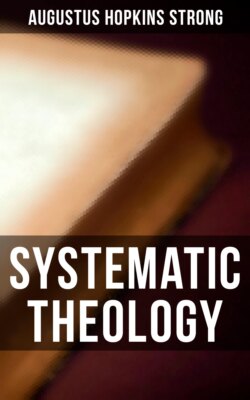Читать книгу Systematic Theology - Augustus Hopkins Strong - Страница 107
На сайте Литреса книга снята с продажи.
III. Methods of determining the divine Attributes.
ОглавлениеTable of Contents
We have seen that the existence of God is a first truth. It is presupposed in all human thinking, and is more or less consciously recognized by all men. This intuitive knowledge of God we have seen to be corroborated and explicated by arguments drawn from nature and from mind. Reason leads us to a causative and personal Intelligence upon whom we depend. This Being of indefinite greatness we clothe, by a necessity of our thinking, with all the attributes of perfection. The two great methods of determining what these attributes are, are the Rational and the Biblical.
1. The Rational method. This is threefold:—(a) the via negationis, or the way of negation, which consists in denying to God all imperfections observed in created beings; (b) the via eminentiæ, or the way of climax, which consists in attributing to God in infinite degree all the perfections found in creatures; and (c) the via causalitatis, or the way of causality, which consists in predicating of God those attributes which are required in him to explain the world of nature and of mind.
This rational method explains God's nature from that of his creation, whereas the creation itself can be fully explained only from the nature of God. Though the method is valuable, it has insuperable limitations, and its place is a subordinate one. While we use it continually to confirm and supplement results otherwise obtained, our chief means of determining the divine attributes must be
2. The Biblical method. This is simply the inductive method, applied to the facts with regard to God revealed in the Scriptures. Now that we have proved the Scriptures to be a revelation from God, inspired in every part, we may properly look to them as decisive authority with regard to God's attributes.
The rational method of determining the attributes of God is sometimes said to have been originated by Dionysius the Areopagite, reputed to have been a judge at Athens at the time of Paul and to have died AD 95. It is more probably eclectic, combining the results attained by many theologians, and applying the intuitions of perfection and causality which lie at the basis of all religious thinking. It is evident from our previous study of the arguments for God's existence, that from nature we cannot learn either the Trinity or the mercy of God, and that these deficiencies in our rational conclusions with respect to God must be supplied, if at all, by revelation. Spurgeon, Autobiography, 166—“The old saying is 'Go from Nature up to Nature's God.' But it is hard work going up hill. The best thing is to go from Nature's God down to Nature; and, if you once get to Nature's God and believe him and love him, it is surprising how easy it is to hear music in the waves, and songs in the wild whisperings of the winds, and to see God everywhere.” See also Kahnis, Dogmatik, 3:181.
